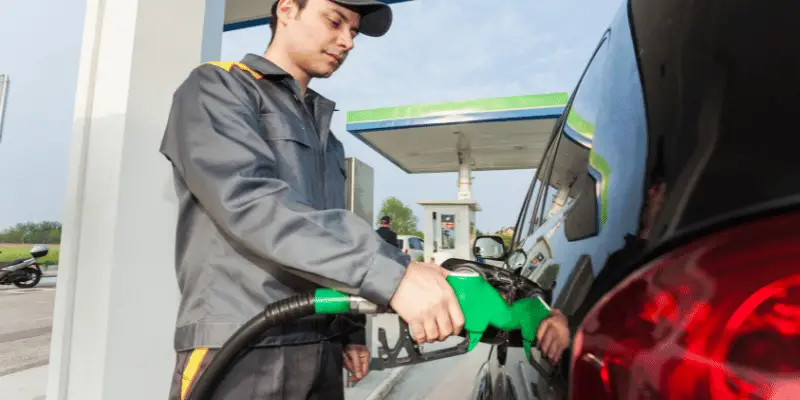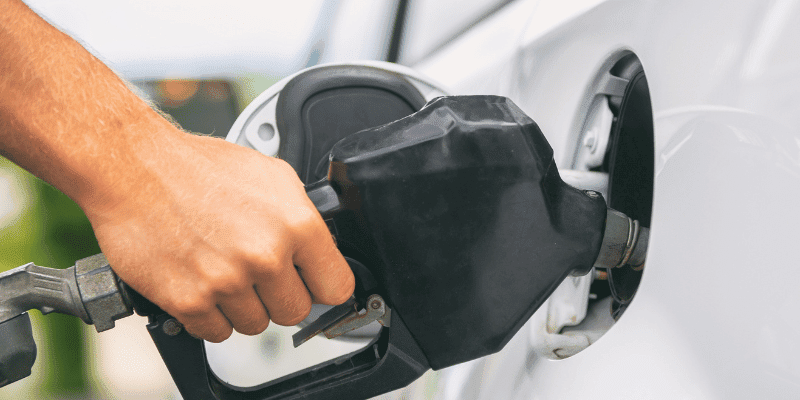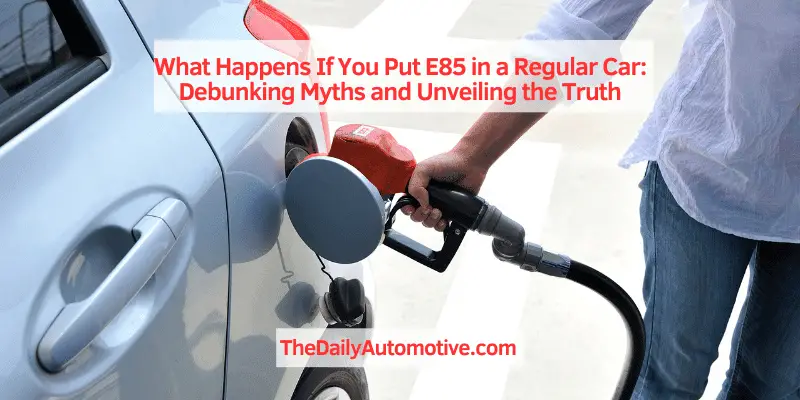What Happens If You Put E85 in a Regular Car : Debunking Myths and Unveiling the Truth
Putting e85 in a regular car can cause engine performance issues and potential damage. Mixing e85 with regular gasoline can lead to fuel system corrosion and result in costly repairs.
When e85 is used in a car not designed for it, the higher ethanol content can cause engine misfires, decreased fuel mileage, and loss of power. It is crucial to use the appropriate fuel type recommended by the car manufacturer to ensure optimal performance and avoid potential damage to the engine.

Understanding E85 Fuel
E85 fuel is primarily designed for flex-fuel vehicles, and putting it in a regular car can cause various issues. The higher ethanol content in e85 can damage fuel system components and negatively impact engine performance and fuel efficiency.
What Is E85 Fuel?
E85 fuel is a blend of 85% ethanol and 15% gasoline. It is commonly used as an alternative fuel for certain types of vehicles. Ethanol, which is made from corn or other agricultural products, provides the majority of the fuel’s content.
E85 fuel is primarily used in flex-fuel vehicles (ffvs), which are designed to run on both gasoline and ethanol blends.
Composition Of E85 Fuel
The composition of e85 fuel consists of the following elements:
- 85% ethanol: The main component of e85 fuel is ethanol, which is derived from renewable sources like corn or sugar cane. Ethanol is known to burn cleaner and produce fewer emissions compared to gasoline.
- 15% gasoline: To ensure proper engine performance, e85 fuel also contains a small percentage of gasoline. This helps in ignition and enhances the overall functionality of the fuel.
Benefits Of Using E85 Fuel
Using e85 fuel offers several advantages for both the environment and drivers:
- Renewable energy source: E85 fuel is derived from renewable sources, making it a more sustainable option compared to fossil fuels. It helps reduce dependence on non-renewable resources.
- Reduced emissions: Ethanol burns cleaner than gasoline, leading to lower levels of harmful emissions such as carbon monoxide, particulate matter, and greenhouse gases. This promotes better air quality and reduces pollution.
- Performance potential: Some ffvs have engines specifically optimized for e85 fuel, allowing them to deliver enhanced performance. The higher octane rating of ethanol can result in increased power output.
- Potential cost savings: In certain regions, e85 fuel may be priced lower than regular gasoline, providing potential cost savings for consumers who own ffvs. However, availability and prices can vary.
Differences Between E85 And Regular Gasoline
There are several key differences between e85 fuel and regular gasoline:
- Ethanol content: E85 fuel contains a significantly higher amount of ethanol (85%) compared to regular gasoline, which contains virtually no ethanol.
- Energy density: Ethanol has a lower energy density than gasoline, meaning that a larger volume of e85 fuel is required to produce the same amount of energy as gasoline. This can result in reduced fuel efficiency and potentially lower mileage.
- Fuel system modifications: Ffvs are manufactured to be compatible with both e85 fuel and gasoline. However, regular vehicles (non-ffvs) are not designed to handle the higher ethanol content of e85 fuel. Using e85 fuel in a regular car can damage the engine and fuel system components.
- Availability: E85 fuel may not be widely available and accessible at all gas stations, limiting its practicality for some drivers.
Common Misconceptions About E85 Fuel
There are a few common misconceptions regarding e85 fuel:
- Better fuel economy: While ethanol has a higher octane rating than gasoline, e85 fuel generally delivers lower fuel economy due to its lower energy density. It may require more frequent refueling compared to regular gasoline.
- Compatibility with regular cars: E85 fuel is specifically designed for use in flex-fuel vehicles, not regular cars. Using e85 fuel in a regular car can lead to severe engine damage and expensive repairs.
- Increased power in regular cars: Regular cars are not optimized to take advantage of the higher octane rating of e85 fuel. Therefore, using e85 fuel in a regular car does not typically result in increased power or performance.
Understanding the basics of e85 fuel is crucial to ensure safe and efficient usage. By comprehending the differences between e85 fuel and regular gasoline, drivers can make informed decisions about fuel choices and vehicle compatibility.
Effects Of Putting E85 In A Regular Car
Putting e85 in a regular car can have detrimental effects on its engine and fuel system. The high ethanol content in e85 can cause damage to the fuel lines, fuel injectors, and seals, leading to costly repairs and decreased performance.
It is essential to use the recommended fuel for your vehicle to avoid these issues.
When it comes to fueling up our vehicles, we usually stick to the recommended gasoline type indicated by the manufacturer. But what if you accidentally or intentionally put e85, a blend of 85% ethanol and 15% gasoline, in your regular car?
Well, there are a few important effects to consider. Let’s take a closer look at the impact on engine performance, potential damage to fuel system components, malfunctions and warning signs to watch for, as well as the long-term effects on your car.
Impact On Engine Performance:
- Decreased fuel efficiency: E85 has a lower energy content compared to gasoline, resulting in reduced mileage per gallon. You may experience a noticeable decrease in fuel efficiency when using e85 in a regular car.
- Altered combustion process: E85 requires a different air-fuel ratio for optimal combustion compared to gasoline. Since regular cars are not designed to handle high ethanol blends, putting e85 in your tank can lead to an inconsistent combustion process, potentially affecting your engine’s performance.
- Reduced power output: Due to the different energy content and combustion characteristics, using e85 in a regular car can result in decreased power output. Your vehicle may feel less responsive and struggle to achieve the same level of acceleration as when using gasoline.
Potential Damage To Fuel System Components:
- Corrosion: Ethanol has a higher ability to absorb moisture, which can lead to water accumulation in the fuel system. Over time, this can cause corrosion in various components, such as fuel lines, injectors, and seals. Using e85 in a regular car increases the risk of accelerated corrosion.
- Deterioration of rubber and plastic parts: E85 can have a corrosive effect on rubber and plastic components of the fuel system. Seals, gaskets, and other parts may deteriorate more quickly when exposed to e85, potentially leading to leaks and malfunctions.
Malfunctions And Warning Signs To Watch For:
- Check engine light activation: Using e85 in a regular car can trigger the check engine light due to the altered combustion process and potential fuel system issues. This warning indicator serves as a helpful signal that something may be amiss.
- Difficulty starting the engine: Ethanol can be harder to ignite compared to gasoline, resulting in difficulties starting the engine, especially in colder temperatures. If you experience prolonged cranking or hesitation when starting your vehicle, it could be a sign of using e85 in a regular car.
Long-Term Effects On The Car:
- Engine damage: Repeatedly using e85 in a regular car can lead to engine damage over time. The corrosive nature of ethanol, along with the altered combustion process and potentially inadequate lubrication, can wear down engine internals, such as valves, pistons, and cylinder walls.
- Increased maintenance needs: E85 may require more frequent maintenance, such as fuel system cleaning, in order to counteract its potential negative effects. Regular cars are not designed to handle high ethanol blends, so using e85 can lead to additional maintenance costs and efforts.
Overall, putting e85 in a regular car can have significant effects on engine performance, fuel system components, and long-term car health. It’s important to stick to the recommended fuel type to avoid these potential problems and keep your vehicle running smoothly.
Dispelling Myths About E85 In Regular Cars
Using e85 fuel in a regular car won’t cause any immediate damage, but it can impact performance and fuel efficiency. E85 is primarily designed for flex-fuel cars and its higher ethanol content can lead to engine misfires and reduced mileage in regular vehicles.
If you’ve been hearing about e85 fuel lately, you might be curious to know if it’s suitable for regular cars or just for dedicated flex-fuel vehicles. E85 is a blend of 85% ethanol and 15% gasoline, and it’s become increasingly popular due to its potential benefits, such as lower emissions and a reduced dependence on fossil fuels.
However, it’s important to separate fact from fiction when it comes to using e85 in regular cars. In this section, we will debunk some common myths surrounding the use of e85 fuel in regular vehicles.
Myth 1: Improved Performance With E85 In Regular Cars
- E85 fuel offers improved performance: While it’s true that e85 has a higher octane rating compared to regular gasoline, which can potentially enhance the performance of certain high-compression engines, its impact on regular cars may be limited. The benefits of improved performance with e85 are more noticeable in vehicles specifically designed for flex-fuel usage.
Myth 2: Higher Fuel Efficiency With E85
- E85 provides better fuel efficiency: Contrary to this belief, e85 is actually known to deliver lower fuel efficiency compared to gasoline. Ethanol contains less energy per unit volume than gasoline, resulting in reduced mileage. In regular cars, the engine may not be optimized to fully utilize the advantages of e85, leading to decreased fuel efficiency.
Myth 3: No Harm To The Engine Or Fuel System
- E85 poses no harm to the engine or fuel system: Although modern vehicles are designed to handle e85 fuel to some extent, putting it in a regular car can have negative consequences. The components of the engine and fuel system may not be specifically engineered to handle the corrosive effects of ethanol, potentially leading to damage over time. It’s best to consult the manufacturer’s recommendations for compatibility before using e85 in a regular car.
Myth 4: E85 As A Cheaper Alternative To Regular Gasoline
- E85 is a cheaper alternative to regular gasoline: While the price of e85 may be lower than regular gasoline, it’s important to consider the fuel efficiency aspect. Since e85 delivers lower mileage, the cost per mile might even out or be higher compared to using regular gasoline. Additionally, the availability of e85 can be limited in certain areas, creating logistical challenges for drivers.
It’s crucial to remember that each vehicle is different, and the impact of using e85 fuel in a regular car can vary. Before considering e85 as an option, it’s recommended to consult with a trusted mechanic or refer to the manufacturer’s guidelines to ensure that your vehicle is compatible.
While e85 offers potential benefits for specific applications, it’s important to dispel these myths and obtain accurate information before making any decisions.
The Truth About Using E85 In Regular Cars
Using e85 fuel in a regular car can have detrimental effects. The high ethanol content can cause engine damage, decreased fuel efficiency, and potential performance issues. It’s essential to use the correct fuel for your vehicle to avoid costly repairs and maintenance.
Is it safe to use e85 fuel in regular cars? What happens if you fill up your tank with this ethanol-blended fuel? In this section, we will explore the truth behind using e85 in regular cars and address important factors such as compatibility issues, modifications required, effectiveness of conversion kits, manufacturer’s recommendations and warranties, as well as the environmental impact of e85 fuel.
Compatibility Issues And Modifications Required:
Using e85 in regular cars can lead to compatibility issues due to the higher ethanol content. Here are some key points to consider:
- Many regular cars are not designed to handle e85 and may not have the necessary components to safely use this fuel.
- E85 can cause damage to rubber and plastic parts in the fuel system, leading to leaks and potential engine breakdowns.
- Fuel pumps, fuel lines, and injectors may need to be upgraded or replaced to withstand the corrosive effects of e85.
- The engine control unit (ecu) may need to be reprogrammed or modified to optimize performance with e85.
E85 Conversion Kits And Their Effectiveness:
For those interested in using e85 in their regular cars, e85 conversion kits are available. Here are some key points about these kits:
- E85 conversion kits modify the fuel system of a regular car to make it compatible with e85 fuel.
- These kits typically include components such as fuel injectors, fuel pressure regulators, and upgraded fuel lines.
- The effectiveness of e85 conversion kits can vary depending on the make and model of the car, as well as the quality of the kit itself.
- Some cars may require additional modifications beyond the conversion kit to ensure optimal performance.
Manufacturer’s Recommendations And Warranties:
Most car manufacturers have specific recommendations when it comes to using alternative fuels like e85. Here’s what you need to know:
- Using e85 in a regular car that is not specifically designed for it can void the manufacturer’s warranty.
- Some manufacturers offer flex-fuel vehicles that are specifically designed to run on e85 without any modifications.
- It’s crucial to consult the vehicle’s manual or contact the manufacturer to understand their recommendations and warranty implications.
Environmental Impact Of E85 Fuel In Regular Cars:
While e85 is touted as a more environmentally friendly fuel option, using it in regular cars has its complexities. Consider these points:
- E85 fuels are made up of a higher percentage of ethanol, which is derived from renewable resources like corn or sugarcane.
- Despite its renewable origin, the production of ethanol can still have environmental impacts, such as land use change and increased pesticide usage.
- Regular cars running on e85 may experience a decrease in fuel efficiency due to the lower energy content of ethanol compared to gasoline.
- The overall environmental benefit of using e85 in regular cars depends on various factors, including the source of ethanol, vehicle efficiency, and individual driving habits.
Using e85 in regular cars requires careful consideration of compatibility issues, potential modifications, and manufacturer’s recommendations. While e85 conversion kits can make regular cars compatible with this fuel, their effectiveness may vary. It’s important to weigh the environmental impact and understand the potential warranty implications before making the switch to e85 fuel.

Frequently Asked Questions For What Happens If You Put E85 In A Regular Car
What Do I Do If I Accidentally Put E85 In My Car?
If you accidentally put e85 fuel in your car, here’s what you should do:
1. Stop using the e85 fuel immediately.
2. Do not try to start your car or drive it further.
3. Call a professional mechanic or tow service to have your car towed to a nearby service station.
4. At the service station, they will drain the e85 fuel from your car’s tank and flush it with regular gasoline.
5. The mechanic may also need to inspect your fuel system for any potential damage caused by the e85 fuel.
6. Once your car is clean and filled with the correct gasoline, you should be able to drive it without any issues. Remember, using the wrong type of fuel can damage your car’s engine and other components, so it’s crucial to address the situation promptly.
Can E85 Damage My Engine?
E85 fuel can potentially damage your engine if it’s not designed to handle the higher ethanol content. It can cause corrosion, fuel system component failure, and reduced engine performance. It’s essential to check your vehicle’s owner’s manual to see if it’s compatible with e85.
Cars that are flex-fuel vehicles or have specifically designed engines can safely use e85 without any issues. However, if your engine isn’t compatible, it’s best to avoid using e85 to prevent any potential damage. Regularly using e85 in an incompatible engine can lead to costly repairs and decrease the lifespan of your engine.
Always consult your vehicle manufacturer’s recommendations before using e85 fuel.
Will E85 Damage My Fuel Pump?
E85 fuel may not necessarily damage your fuel pump. However, it’s important to note that e85 has a different composition compared to regular gasoline. E85 is a blend of 85% ethanol and 15% gasoline, which means it has a higher ethanol content.
Ethanol has corrosive properties that can deteriorate certain types of fuel pumps, especially those made of rubber or plastic. If your fuel pump is not designed to handle ethanol, it may get damaged over time. To avoid potential issues, it’s recommended to use a fuel pump that is compatible with e85 or ethanol blends.
It’s also a good idea to consult your vehicle’s manufacturer or a qualified mechanic for specific recommendations regarding fuel compatibility.
What Happens If You Put 85 Gas In An 87 Car?
Putting 85 gas in an 87 car can cause engine knocking and reduced performance.
Conclusion
It is clear that putting e85 fuel in a regular car can have detrimental effects on the engine and overall performance. The high ethanol content in e85 can cause damage to various components, including the fuel system and exhaust system.
This can result in decreased fuel efficiency, reduced power, and potential long-term damage to the engine. It is important for car owners to understand the specific requirements of their vehicles and use the appropriate fuel to avoid any potential problems.
While e85 offers certain benefits, such as lower emissions and potential cost savings, it is designed for use in flex-fuel vehicles and not recommended for regular cars. By following the manufacturer’s guidelines and using the correct fuel, car owners can ensure the longevity and optimal performance of their vehicles.









2 Comments